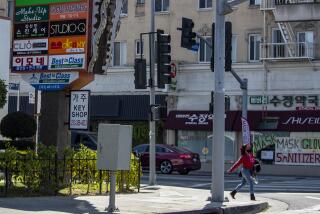Banks in Poor Neighborhoods
- Share via
* Right-wing critics like Paul Craig Roberts (Column Right, July 27) like to claim that the 1977 Community Reinvestment Act (CRA) is used to force banks to make bad loans to undeserving people. Nothing could be further from the truth.
Hardly anyone denies the overwhelming statistical reality: Poor neighborhoods have little or no banking services; there is convincing, pervasive evidence of discrimination by lenders; and yet, 93% of banks are rated as good or outstanding in their CRA performance. Nobody believes the law is forcing banks to do anything except stuff their files with paperwork. What is needed is a commitment to ensure that banks do what they are chartered to do: serve their local communities.
Making loans to people of modest means is not inherently risky.
For example, a study of 1.7 million mortgages in the Federal Housing Administration (FHA) system shows that poor people less often default on their home loans than others. The data reveals that the default rate of home mortgages increases significantly when the amount rises over $125,000 and then again when it rises over $200,000.
Lending institutions established specifically to serve lower-income communities have shown positive returns. Over the past 30 years, community development credit unions have made over $2 billion worth of loans. Their losses on average have not exceeded 2%. For some credit unions, losses have not exceeded 1%.
Low-income and minority persons have the same needs for access to credit and other financial services that anyone else does. Just because a customer lives in a predominantly minority neighborhood does not exempt him or her from needing a safe place to put his or her savings.
If banks did a great job, there wouldn’t be a booming business for check-cashing outlets, pawn shops, liquor stores, and rent-to-own operators. Yet, within a 40-square-mile area, in South-Central Los Angeles, there are 21 banks for 587,000 people versus 133 check-cashing outlets. Those without bank accounts are often forced to use these check-cashing outlets to cash their checks, all the while paying fees which take a large bite out of their incomes.
The combination of discrimination in the banking industry (whether intentional or otherwise) and the fear of lending in low-income and minority areas has left these communities adrift without access to basic financial services. It is time we address the needs of these communities. The Community Reinvestment Act remains the only tool the public has to challenge banks to lend to credit-worthy individuals regardless of where they reside.
REP. HENRY S. GONZALEZ
Chairman, House Banking, Finance and
Urban Affairs Committee, D-Tex.
More to Read
Inside the business of entertainment
The Wide Shot brings you news, analysis and insights on everything from streaming wars to production — and what it all means for the future.
You may occasionally receive promotional content from the Los Angeles Times.










